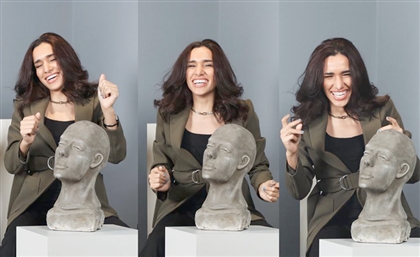Sheikh Jackson Film Review: The Three Jacksons
In her CairoScene debut, Sharine Atif examines the trichotomy of Sheikh Jackson and what it says about our culture.

Wow… Where do I start. I mean, what a great film to open up at the 1st Edition of the Gouna Film Festival. When I had just learned about this film on social media, the hype was quite ironic. I had no idea what to expect from a sheikh in a Galabeya doing the moonwalk. But I was surprised to find it a very resonating and well-made film.
Not only were the visuals effects great, but so were the screen direction, camera movement, and the performances. All told, it is a picture that’s so relatable on so many levels. I can write pages on each element but my review will focus mainly on the storyline that blew my mind.
Ahmed Fishawy plays Sheikh Jackson, a Sheikh who has been terrified of his faith weakening ever since he learned that his teenage icon Michal Jackson has died.
The film Sheikh Jackson is in the style of stories within stories. The first story depicts Sheikh Jackson in present time, a devoted man of God who prays and leads prayers, he lives his life only for the afterlife and is fearful of committing sins to the extent of wearing a ring that counts sins and good deeds. His conflicted different selves manifest into three pivotal phases of his life with the ghost of Michael Jackson appearing while he’s in the midst of worshiping God in present day. Think A Christmas Carol.
As a grown and religious man, the adulation of Michael Jackson is considered something forbidden and unholy to Sheikh Jackson. So he decides to see a therapist in the hopes of resolving his inner conflict, mainly by complaining about not being able to cry anymore. We cut to a parallel storyline taking us to the past, Sheikh Jackson as a young boy, revealing the first time he cried when he lost his mother; the answer to what his therapist had asked.
A third parallel of the story takes us to Sheikh Jackson as a teenager who obsesses over Michael Jackson. The second time he remembers crying.
The Writer/Director Amr Salama brilliantly wrote the screenplay in a way where he associates the lessons an adolescent Sheikh Jackson learns as he grew up with the lyrics of Michael Jackson’s songs. Something only us teenagers of the time would understand and relate to, because Michal Jackson made his music for us, and the older generations who perhaps didn’t understand English or his lyrics, simply judged the artist by his queer looks.
One scene that perfectly elucidates the essence of Sheikh Jackson is where an adolescent Khaled (Ahmed El Fishawy) refuses to hit a bouncer who’d beaten him back after his father tells him to, saying that he’d forgiven the man. Khaled’s father then scolds him for not being a man. The scene ends with a subtle tune of Michael Jackson’s Beat It; a song that highlights the unimportance of who’s wrong or right and how one should choose their fight. Brilliant!
Growing up with, Khaled’s father would tell him that Jackson is effeminate. Now I can’t help but getting personal here, because I’m also the type of filmmaker who writes and directs things that I experienced. My father once shouted, “Michael Jackson is gay,” when he heard me playing Michael Jackson’s You Are Not Alone, and like Khaled, I happened to be in Alexandria as well. I remember developing hatred and animosity towards him. It was until I moved back to New York City as a young adult, years later, when Michael Jackson died, that I rediscovered him all over again, and his immortal art echoed and lived on and was timeless, a theme very well-articulated in Amr Salama’s film.
I’m sure so many millennials may have experienced the same and would appreciate this film in a certain respect. I also learned something I never knew before. Being a teenager who grew up in Egypt to an Egyptian father, who dealt with so many forms of societal oppression, I always thought men had it easy. I never thought that young men in Egypt would also be experiencing some sort of oppression, one that forces them into being a man, one where they’re told they aren’t if they cry or don’t beat someone back to get even and establish dominance. So I really appreciated seeing this and thank the director for it.
The movie will be screened again on Sunday September 24 at 6:30PM at the Audimax (TU Berlin) theatre.
- Previous Article Egypt’s Newest Public Transport Service To Be Launched By Uber
- Next Article This Nursery Is Changing the Preschool Education Game in Egypt
Trending This Week
-
Mar 09, 2025























